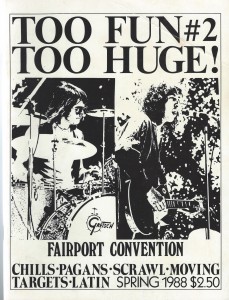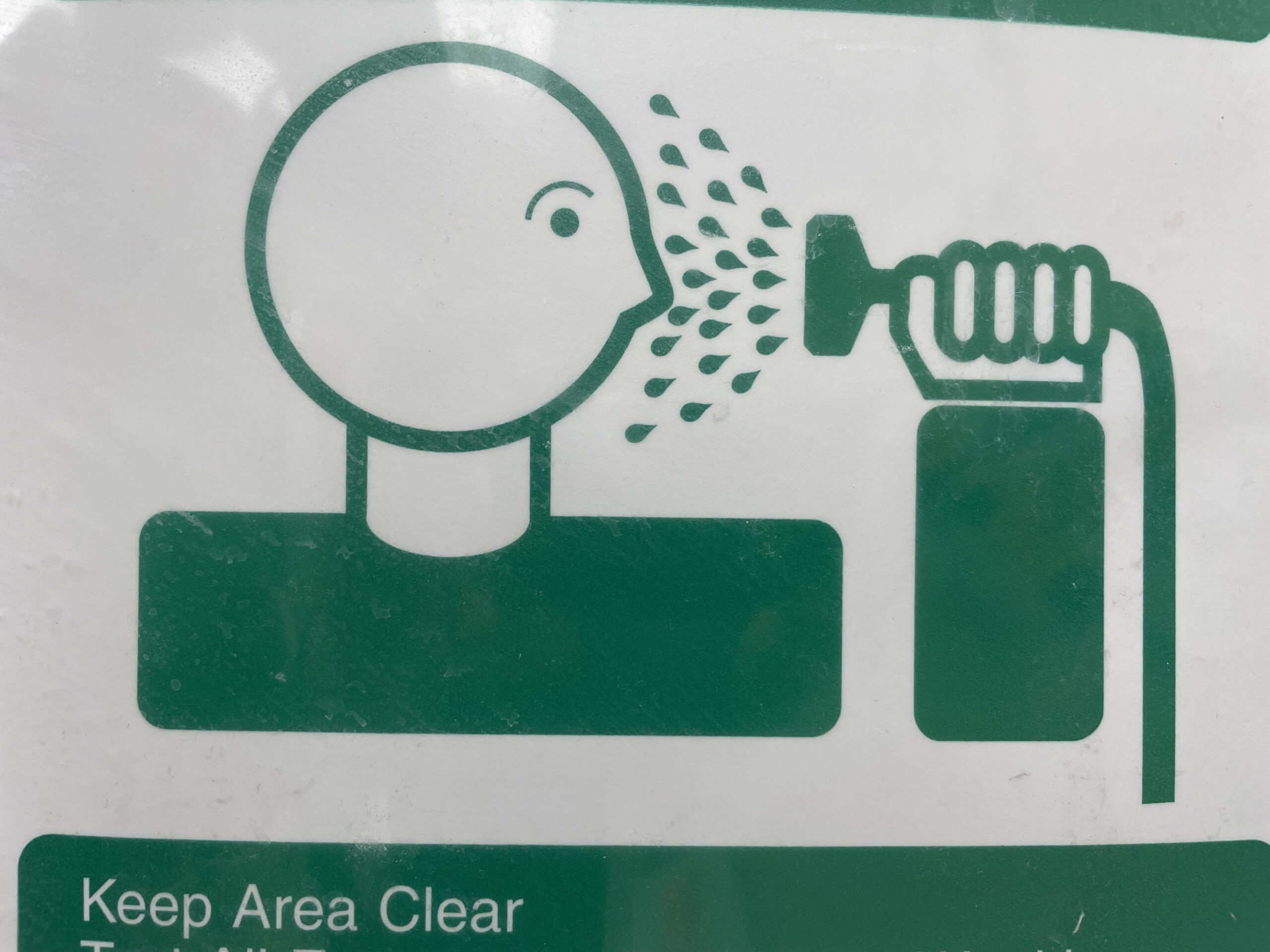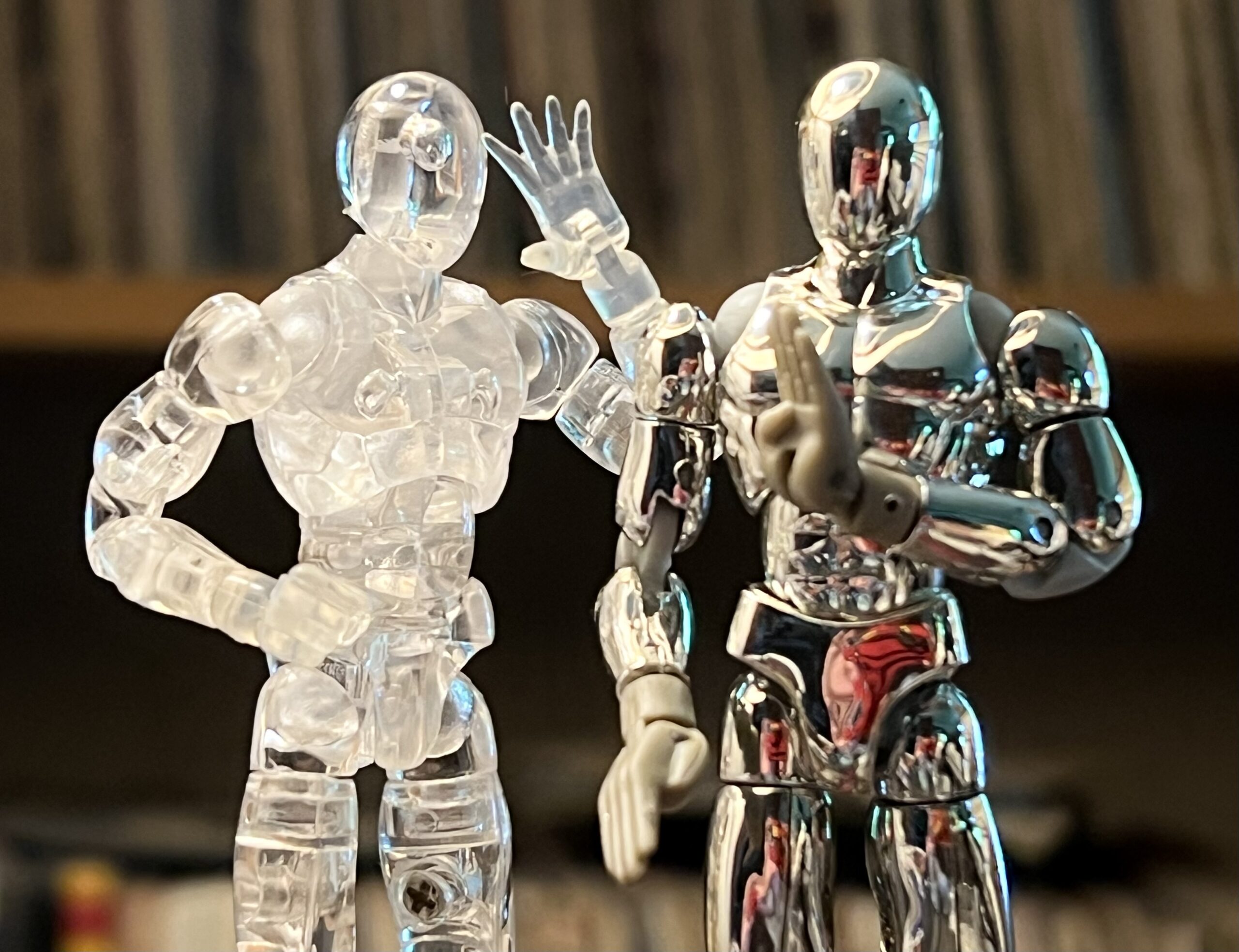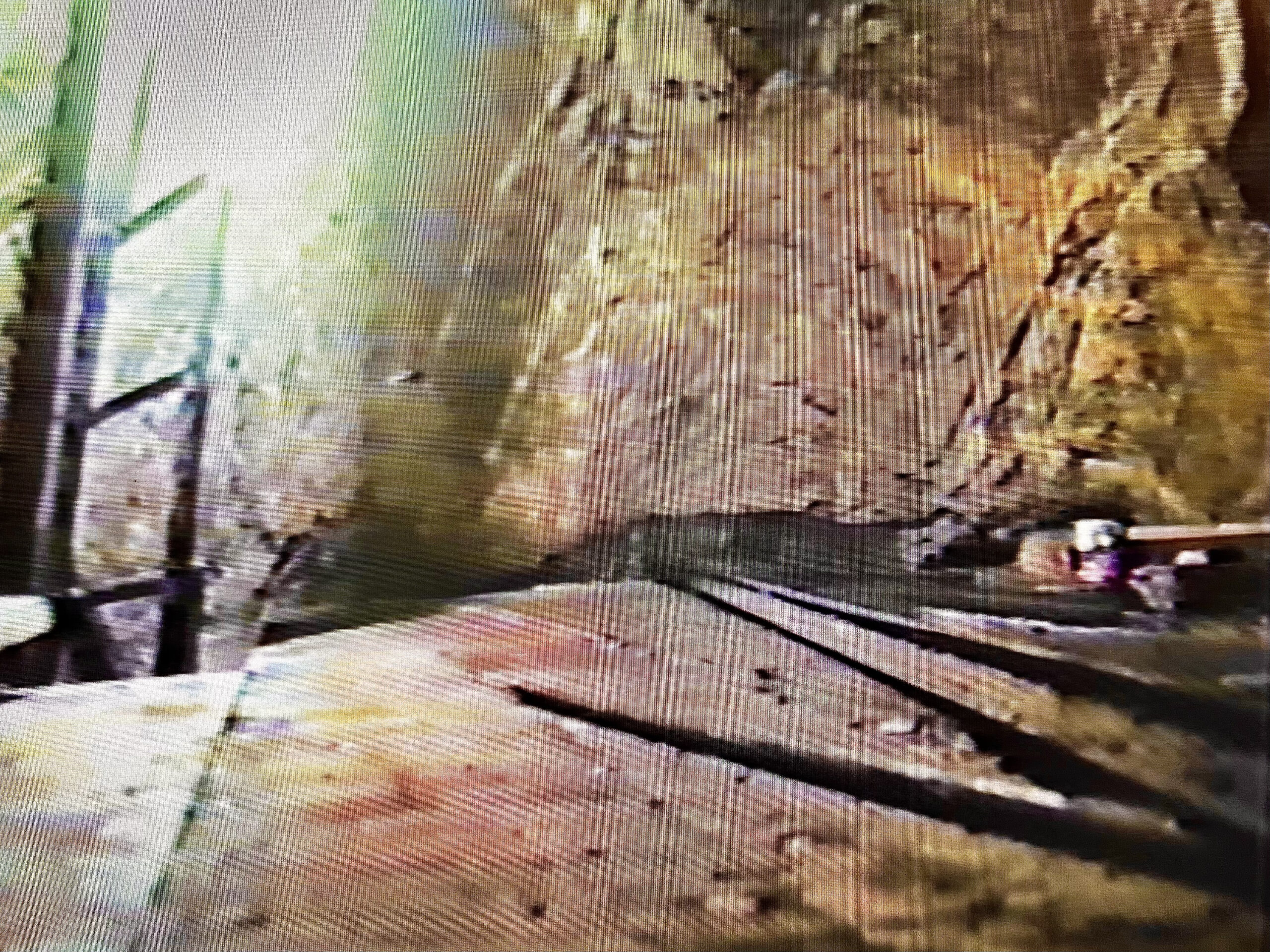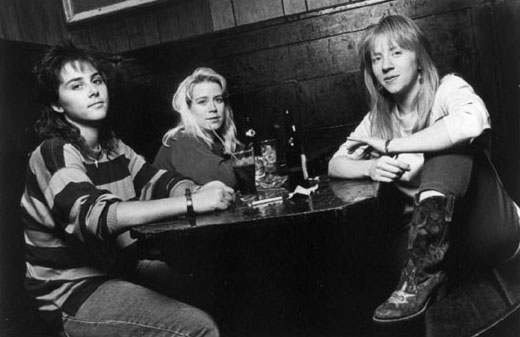
Rock and roll is, always has been, an art of youth, of spontaneity, of simplicity as a protest against old rules, a protest born out of hedonism (Chuck Berry, the Who), or lust (the Who, Chuck Berry), or moral outrage (Minor Threat), or existential despair (“Paint It Black,” “Smells Like Teen Spirit”). It’s an art of the moment, of damn the consequences, of turning it up and not caring what happens next: it began as a guy thing, of course, but the history of women making rock music is a history of women finding ways to give those qualities feminist ends: “Rebel Girl, you are the queen of my world.” It began as party music, as music to dance to, but even its most introverted, unhappiest actors—from Neil Young to PJ Harvey or Conor Oberst—embodied the impulse to be individual, telling the world to fuck off, saying “I’m on my own.” When rock becomes too predictable, we complain about routinized or commercial rebellion; when it’s working, we identify its sounds (guitars first, live feel, 4/4 beat, and drums) with living in the moment, going for broke, smashing things (if not people), saying no to the Man, or no to the responsible older sibling, or no to Mom.
So what does it mean to make rock music that speaks for the responsible older sibling; for the friend who cleans up after the party; for the people who won’t leave work early for the party, because they need the extra hours; for Mom? How would that sound? It might sound like Scrawl. Through the rise and fall of American indie rock, the years of hardcore and hair metal, college radio and Nirvana, Oasis and No Depression and Riot Grrrl, from the early 1980s to the Y2K bug, the Columbus, Ohio trio were making stripped-down rock music that performed—sadly, angrily, beautifully, roughly, then elegantly— just the opposite of what we usually expect rock music to do. It could be a bummer, but it was a glorious bummer, and its propulsive, melodic and serious sounds—as well as its no-nonsense lyrics—embodied the truths that most rock music tries to deny.
Virginia Woolf called Middlemarch “one of the few English novels written for grown-ups.” Scrawl began when its members were in their early twenties, but from the get-go they were one of few American bands—maybe the first—who played punk-rock-inspired music about being, and becoming, and feeling like, grownups. They were the ones with the car keys, the ones who cleaned up after the host passed out and the guests had all left the party, the caretakers, the ones left holding the bag, and if you think that’s an anomalous, almost paradoxical approach to rock and roll, you’re right. Their midtempo rhythms and minor keys (they often write in minor keys) make their best songs glow like blacksmiths’ ingots, heated by frustrations and responsibilities that neither sweet reason nor scowling anger removes.
That makes them ideal for people who want rock and roll but can’t take the optimism, or the selfish angst, on which so much rock depends. When I’m feeling sorry for myself, or when I’m glad, I’ve got plenty of choices: but when I’m feeling like a moral failure, like I haven’t done enough for others, like the universe is (as Randall Jarrell wrote) a squirrel wheel, and if I run fast enough (but I can’t run fast enough) I can solve other people’s problems, make other people happy—when I feel like that, I listen to Scrawl. Guitarist and principal singer Marcy Mays, bass (and later piano) player Sue Harshe, and their drummers (first Carolyn O’Leary, then Dana Marshall) used simple words, minor chords, and dissonant intervals to portray not unbearable dejection, but the more or less bearable kind: the feeling of trying and failing, and trying and failing, and knowing you have no choice but to try again.

[photo credit: Derek von Essen]
Today I’ve been listening mostly to Travel On, Rider (1996), their most ambitious album, one that left some of their indie loyalists cold. Each time a different track stands out; this morning it was the gritty, discomfiting breakup song “Come Back Then.” “Come back when I’m good and ready,” Mays says, over and over. She never will be ready: he’ll never come back, and her attitude doesn’t get worse, but doesn’t get better. It simply stays put in its comfortless three-chord loop. Most rock and roll is about beginnings and endings: “Come Back Then,” like most Scrawl songs, is all middle, its minimal chords describing the task and fears we can’t escape (as the poet says) but can’t accept. Another song from that album, “I’m Not Stuck,” despite its walking bass, repeats a consolation Mays doesn’t believe. “It might look like my wheels are spinning/ I swear they’re spinning for a reason… I swear, I’m not stuck,” she sings; she’s already forsworn.
These attitudes—though not that piano– were there from the start. Harshe majored in classical piano at Ohio State University in Columbus; she also played bass in a hardcore band called No America, then joined Mays’s half-jokey heavy rock band Skull. In 1985 a chance to open for the Meat Puppets in Columbus inspired Harshe, Mays and O’Leary to find a new name (“Scrawl” sounded like “Skull”), and then to finish and practice a brace of songs. Their set list became Plus, Also, Too (1987), released on the aptly named No Other Records, and recorded (so it sounds) with one guitar, one bass, almost no effects pedals, and a handful of songs starker than pop, more careful than hardcore, and so simple it was hard to explain why they stayed in memory. “I’m sad, and it’s making me mad,” ran the chorus to “Sad”; the chorus to “He’s Walkin’” said “He’s walking, but he’s walking away; he’s walking away from home.”
Plus, Also, Too sounded raw, even amateur, but it also had the dry, strained realism of people who felt too mature to shout all the time: it was as if Harshe and Mays suspected that their short declarative statements, their one-note echoes (see the beginning of “Gutterball“), two-chord assemblies, and three-note bass figures, covered all the 36 dramatic situations life offered, or at least all that it could offer them. Listen to “Sad,” and then listen to that song’s sequel, from Smallmouth (1990), “Rot,” with its contained demolition of a kiss-off chorus: “Thank you, whether I need this or not—keep it, leave it, I’ll watch it rot.” The song’s lead-in, with its airless two-note loop, makes the big chord on “Thank you” feel like an opened door.
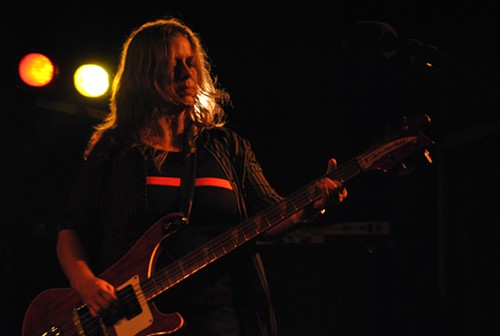
We think of Ohio as a Rust Belt state, and most of its great rock acts have a Rust Belt feel—Pere Ubu’s industrial Cleveland, Devo‘s deadpan robot town of Akron, Guided by Voices‘ Dayton. But Ohio borders Kentucky and West Virginia: if you ever do contract work for the state of Ohio you may be asked to fill out an affirmative-action form that says whether you are “Appalachian.” Mays, born in West Virginia, told an interviewer that she heard “a lot of bluegrass on the radio where I grew up,” and you can hear its twang in her voice, on “Sad,” and in Harshe’s voice on “1≠1,” from He’s Drunk (1988): “Can’t get one to equal one, I never seem to get what I want,” that song goes, as if even the laws of arithmetic conspired against her.
She put that twang to good use on a cover, too. Sports fans know “Rocky Top” as the University of Tennessee fight song; country collectors know dozens of versions. If you hear the truncated “Rocky Top” on He’s Drunk (performed imperfectly with some lyrics omitted) you will hear about a place with no fiddle, no gingham, no warbling nightingales, where “corn won’t grow” (only corn liquor) and there are “no telephone bills” because there are no telephones. There’s not much reason to stay on Scrawl’s version of Rocky Top, but plenty of reason to go back once you go away, since to live, to try to make a living, as an adult in the modern world is to have one’s hopes worn to a nub. (That’s not true for everybody everywhere, of course–but it feels true, for two minutes, while Scrawl plays that song.)
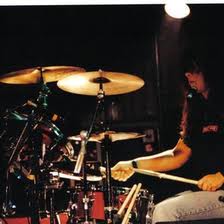
Scrawl also wrote their own songs about making a living; during the 1980s O’Leary did landscaping at OSU, and Harshe worked for the university as “a glorified secretary” (her words). Mays worked for a nonprofit do-gooder: “I’m on a government grant to go out and see poverty in Ohio,” she told the same interviewer. “It’s really… fun.” That kind of sarcasm entered her songs. ‘”Believe,” also from He’s Drunk, interrupts its two-chord pattern for handclaps that sound like a parody of handclaps: they’re waiting for something, anything, worth applause. The shouted chorus in “Breaker, Breaker,” much of it over the same chord, describes a woman who drove “across the Continent” in order to fall out of touch with her so-called friends: “One letter at Christmas is all we get.” “Ready,” a drumless ballad, finds its disappointment not in failed romance but in bad economics: “I spent all the money I made last month, and every cent the month before, and the month before, and the month before, and the month before.” Got a better job in mind for her? Please let her know: “I’m ready, just in case I need to be ready.” If she weren’t already singing, you’d wonder if she was about to break into tears.
But Scrawl never break into tears. They don’t scream, they don’t cry, and if they get mad it’s the disillusioned anger of people who know you catch more flies with honey than with vinegar, and if you’re out of honey, and out of money, you’re out of luck, though you can still complain. And Scrawl’s songs are complaints, in the oldest English sense of the word–the sense that unites Geoffrey Chaucer’s “Complaint to Rosamund,” his unattainable love, with Chaucer’s “Complaint to His Purse”: “Now purse, that been to me my life’s light… Beëth heavy again, or else might I die.” Money mattered to Scrawl, to the emotional lives of the people in their best songs, as it rarely matters in American rock; they earned and squandered or (more often) earned and saved and couldn’t save enough, and they (the people in Scrawl’s songs) knew that even the arts were enterprises, parts of a life that competed with other parts of the same lives for money, attention, time. “Small Day” (also from He’s Drunk) could have been an anthem for small business owners, to be sung at 5:30pm on weekdays: “Should I do more than I’m expected to? Can I start again?” Underneath that chorus a three-chord progression pushes itself around and around, and never goes home.
I fear that I am making Scrawl sound humorless. But even at its bleakest, most subdued, their music gave out the sense that they loved to play it, that they were having fun (the live one-take feel helped). Sometimes they had fun with their lyrics too: “Girl, where did you get that thing? Down at the shopping mall,” they asked at the end of “Let It All Hang Out,” a sequel of sorts to their parodic anthem “Great American Pastime” (the “pastime” is shopping). “Green Beer” recalled a disastrous OSU party: “Why does she always bring her mom on the scene?” “Charles,” from Smallmouth (1990), asks the eponymous boyfriend to “stay up and wait” till “the girls” finish their band practice: “if you do/ I promise you/ It will be worth the wait.” It’s the most casual, understated, promise of romance a pop song has ever contained. “Put out or get out, that’s the way it goes,” Mays says: she’s ready to take him to bed when she comes home, but she’s also ready to kick him out of the house.
“Charles” is funny (it is, among other things, a riposte to the cheesy KISS ballad “Beth”). “Green Beer” is funny too. But even such light fare sounds a bit exasperated, worn out, spread thin. Where most rock and roll makes promises, or else expresses rage at their betrayal, Scrawl sang about what happens after the rage ends, when you realize that adult life is woven out of promises already made. “He says he’s happy,” runs another song from Smallmouth, and you know he’s not– when happiness enters their songs, it’s relentlessly practical. There’s the job, and the boyfriend (Charles), and the band, and then there are friends, and then there’s the job again. “Clock Song,” from Bloodsucker (1991), is all about busyness and overcommitment. “Could have done this yesterday, that’s what I say every day,” its chorus muses, and its repeated cries of “Go, girl, go!” are as much exasperation as inspiration: you can make it, yes you can! all the way to the landscaping job, to the shopping mall, to the office-supply store. (The vibe of relentless adult responsibility did not stop an enterprising director from making it the takeaway song from the delightful 1995 film The Incredibly True Adventures of Two Girls in Love.)
Once the band tried to make a career out of music, they found more frustrations, and hence more causes for Scrawl songs. The United States subsidiary of the British label Rough Trade, who reissued Plus Also Too and released He’s Drunk and Smallmouth, went bankrupt in 1990-91; the band had to bid for their discarded masters at auction. Bloodsucker came out on Feel Good All Over, a tiny indie at the time (it would later release the Magnetic Fields’s Holiday). “We paid for this recording,” the booklet in Bloodsucker said; “we got tired of waiting for faxes, phone calls, contracts, money and bankruptcy notices.” The message, like the production, like the songs, took the do-it-yourself side of punk to heart and let the spit-at-the-audience macho parts go.
And speaking of macho: during the 1980s, years before Riot Grrrl, the indie rock scene was (even) more sexist than it can be today. Just by being a band where women wrote and sang all the songs, Scrawl stood out. But the members of Scrawl didn’t like to talk about gender—”people focus on it, and it’s a bummer,” Mays told the fanzine Too Fun Too Huge in 1988; “we had an interview once that said ‘Even though they’re women they can still play their instruments.’” Instead, the band put their politics into their songs; with its metronomic bass figure, its overlapping riffs on overcrowded days, “Clock Song” sounds like a protest against what the sociologist Arlie Hochschild called “the second shift,” the nearly intractable and mathematically confirmable fact that in most American families adult men and adult women, daughters and sons, expect the women to do most of the unpaid labor– cooking, cleaning, budgets, calendars, as well as hour-by-hour child care. (If you don’t believe me, believe Brigit Schulte’s 2014 book Overwhelmed.) And Scrawl were almost alone in America in trying to make that overwhelmed feeling a source for rock sounds. The singer in “Please Have Everything,” also from Bloodsucker, repeats the title line till she’s almost stopped meaning it—she feels that she has to give her time away, to a depressed friend who will just keep taking it. That gendered sense that your time does not belong to you, that other people think it doesn’t even on days when you think it does, also lies behind the role reversal of “Charles,” where it’s the man who must wait, and must change.
If there were ever a right time for Scrawl to get big, it would have been 1991-93, when Nirvana-inspired attention to all things “indie,” and the wider, often prurient, interest in “women in rock” put Scrawl on journalists’ radar. Scrawl played with Nirvana, Bikini Kill and Beat Happening at the now legendary Kill Rock Stars festival in Olympia, Washington in 1991, but they were too old, or too skeptical, to feel comfortable in that scene; asked about Riot Grrrl in 1993, Harshe shrugged, “We got some publicity out of it.” Mays sang on the Afghan Whigs’ college hit “My Curse” (1994). Steve Albini, who produced Nirvana’s last album, agreed to produce Scrawl’s next one, Velvet Hammer (1994). That album came out on Simple Machines, an independent label that kept its promises, supported the band for the rest of their career, and brought Bloodsucker back into print (see http://www.simplemachines.net/scrawl.html). Jenny Toomey and Kristin Thompson, who ran Simple Machines, also had their own band, Tsunami; they, too, sang—in poppier, more elaborate forms– about responsibility, about hating to pick up after your rock and roll friends and yet not wanting to let them down.
Amid these causes for optimism, with these like-minded, forward-looking allies, Scrawl turned in the most downbeat record of their career. “I’ve made myself so small I feel like I’m not here… my dreams were too hard to keep up with,” Mays sang in “Disappear Without a Trace.” With O’Leary gone, the band had a new drummer, the Columbus journeyman Dana Marshall; the loud songs had a lumbering despondence, the drums in front of the guitars, as in “Face Down” (“I’m not on my knees, I’m face down”). The best song was the quietest, “Blue Green Sea,” whose chords barely changed while the bass line swam on beneath: “tell me I’m your only, and take me in your arms,” Mays asked the sea; “treat me like your angel, and keep me safe and warm.” So she asks—while she sounds like she’s freezing to death.
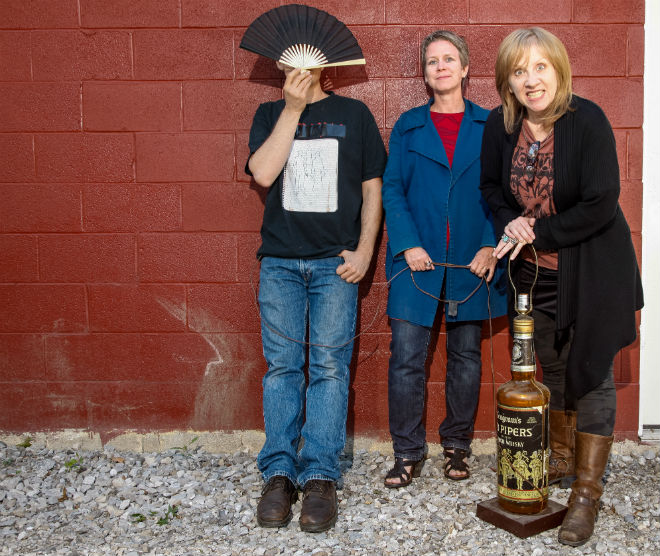
Albini once published an essay called (depending on the version you saw) either “The Problem with Music” or “Some of Your Friends Are Already This Fucked.” The essay explained the economics of major labels: what bands who signed majors’ standard contracts got paid on paper, what got “recouped” (deducted) from that sum (nearly everything—recording expenses, tour expenses, videos), what the labels expected (worldwide hits, or else), what members of those bands would probably net (a few thousand dollars apiece) and how they often ended up (crushed by debt and stuck in contracts that prevented them from releasing music on independent labels again). I don’t know if Mays, Harshe and Marshall had read the essay before they signed with Elektra, but if not, I suspect they wish they had; their late career fell out much as Albini warned. Travel On, Rider had no hits, and Nature Film (1999) hardly got a release: Elektra dropped Scrawl before the end of their tour.
The strangest song from the Elektra years, “Story Musgrave,” has nothing to do with the music business on its surface, and yet it seems to anticipate those difficulties; certainly it’s about feeling unappreciated despite all your effort and skill. The real Story Musgrave, an astronaut, went into space six times between 1983 and 1996, serving on Skylab and later helping repair the Hubble Telescope. He also, supposedly, tried to contact UFOs; some reports say that he asked them to take him away. I’m smart enough to know you have no use for me,” Scrawl’s “Musgrave” sings, “but sure enough to know you will someday.” He’s speaking to aliens, but also to us. Scrawl liked the song so much they recorded it twice, as a guitar rocker and as a piano ballad. In the superior piano version, minor seconds flicker back and forth in Harshe’s left hand; May’s voice climbs down from a clarion to a whisper, as if to admit that none of us, not even Musgrave, are likely to find some place better than here, some time better than now.
I saw Scrawl live and in person just once, at the end of the Nature Film tour, in 2000, with perhaps twenty fans in a club (the Knitting Factory in New York City) built to hold several hundred. Of course they played their hearts out, in their unpretentious, undramatic way. I even brought home a set list; I wish I could find it. Instead, I have Nature Film, which sounds as if Scrawl knew it would be their last record: their last chance to get their best songs on CD (six older tracks, including “Clock Song,” re-recorded), and their last chance at the harshly ironic cover versions they sometimes created by covering male artists’ songs. Here they took on “Public Image” by Public Image, Ltd., whose singer John Lydon, the former Johnny Rotten, had even more reasons than Harshe, Mays and Marshall to feel burned by the music biz. “You never listened to a word I said,” when Lydon sang, meant that the world got the Sex Pistols wrong; sung by Scrawl, it meant nobody had listened at all. Public or private, famous or obscure, we all sink into a daily grind, as the song itself sinks into its grinding trash-can-lid rhythm, one-two, one-two.
I forget whether Scrawl played “Public Image” at the Knitting Factory, but I’m pretty sure they played “Don’t We Always Get There,” a song about touring, or at least about driving and driving until you can’t be sure why you set out; “any road will do tonight” for this midtempo crawl, in which play becomes work, the freedom of the open road a monotonous obligation. The last road song this sad was Bruce Springsteen’s “Racing in the Street,” but the Boss sang about the vices of a neighborhood he had escaped. Mays and Harshe sing like they can’t. Like no one can and they want to stop telling themselves they ever will.
But Nature Film isn’t all futility, and it’s certainly not all about the business of rock. To live half resolved, half resigned, trying to make a change you no longer believe in, isn’t just the condition of thirtysomething indie-rockers, nor of American liberals: it’s the condition of all life on Earth, or so we might learn from the subtle title track, whose overlapping riffs—ascending minor seconds, a tritone up top—portray life on Earth as a ceaseless activity (predation, camouflage, breeding, and so on) in which everything nonetheless ends up unchanged: “Every story ends with a warning/ And begins on a sunny day.” It would be nice to see each day, each year, as a sunny beginning, the song implies, but this year, this story, will in most ways resemble the last. Life has more middles, more repetitions, than it has beginnings or ends. We can’t go on; we go on.

That’s the sense in the spare, repetitive—and yet exhilarating, existentially bracing– structures of most Scrawl tunes. It’s also the sense of the words to “11:59 It’s January,” a slow song rerecorded for Nature Film, whose original version has a neat back story. Simple Machines in 1993 released a series of two-band, two-song 7-inch singles, one for every month, called the Working Holiday Collection; each song had some link to the season (e.g. a Christmas song, a baseball song, the Fourth of July). Subscribers to the series also got a box to keep the singles in, like the boxes teens carried to sock hops in the 1950s, with a handle, a logo and a polka-dot design. It was all wholesome fun, childlike and optimistic—so was a lot of indie music then—and Scrawl, who had the first song on the first single, set out to undermine it all. “11:59 It’s January” incorporates soft brushes on drums, a bit of an organ line, piano, guitar and the usual complement (usual for Scrawl) of minor seconds and tritones into a New Year’s epitome of irresolution. “Last year went down the drain; they all do, really, so why complain?” Past performance is the best predictor of future performance: why should any grown-up expect much change?
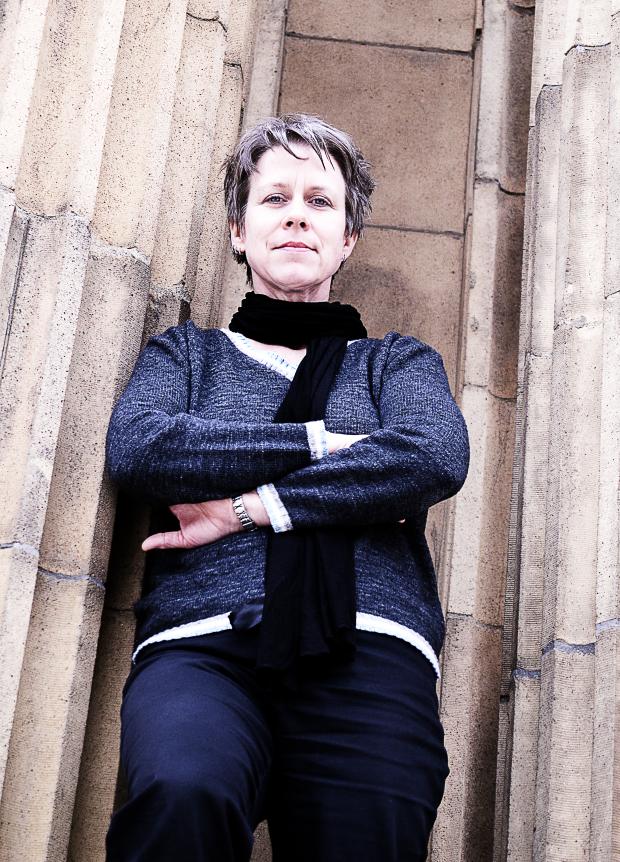
Scrawl seems to have stopped playing out for several years after that Knitting Factory show, in part because Marshall moved to Sweden; Mays and Harshe stayed in Columbus. Mays now owns a bar called Ace of Cups, apparently a great place for bands to play. Sue plays and sings in Fort Shame, where the songs she sings (and presumably wrote) sound like Scrawl songs: the leadoff track on their sole album, Double Wide, is one more complaint on behalf of a woman who couldn’t stay and couldn’t leave: it’s entitled “Someone Turned Her Inside Out.” The album title comes from a piano-based song called “Billy Squier’s Drummer,” about a woman trying and failing to get away from a murderous abuser. The piano chords, unvarying on the one beat, repeat like a warning, or a lament. (Billy Squier’s actual drummer, Bobby Chouinard, who died in 1997, has the same name as a Major League Baseball player convicted of domestic violence, though they are not the same person.) “Trouble” opens with a two-note see-saw of a guitar riff that could have fit on Plus, Also, Too and it’s one more complaint about having to pick up after a friend who can’t pick up after himself. The song neither drags, nor speeds up, but throws its heart into its steady beat. If Sue Harshe made an entire album of solo piano work, that could be an even better contribution to the post-Scrawl world, but it might also be less fun for her. I’ll take what we get. The people in her songs do.
Scrawl play reunion shows in Columbus almost annually now; they also reunited for the rock festival All Tomorrow’s Parties in 2012. I can’t fly to Columbus for shows, but I did see the 2010 reunion broadcast (but, apparently, no longer archived) online. The band headlined an event called Parking Lot Blowout, in an actual parking lot, with Columbus indie-rocker Jovan Karcic (Gaunt) on drums. The set began with “Good Under Pressure” and kept going into a soulful, belted, almost upbeat “For Your Sister.” “Garden Path,” a song that’s equal parts anger at somebody else and anger directed back at the singer herself, went by faster than on record—“That was punk rock!” somebody shouted. Mays and Harshe chatted about a new song (“You’ll have to wait til 2020 to hear it”), then downshifted into “Everyone I See Tonight,” a song that almost cancelled itself out, since it’s got lines about how the singer is “where I don’t wanna be”—but Mays and Harshe were so clearly, at that moment, where they wanted to be.
In fact, the whole show felt like a subdued happy ending, or a happy continuation, of what must have been a frustrating career. If you raise your expectations, if you set out to blaze a trail and strike out on your own, you’ll get burned, or you’ll burn other people (probably other women) on the way—that’s what the earlier Scrawl songs kept on saying; but if you can keep your expectations low, your head level, maybe you’ll be able to succeed on your own nervous terms and bring other people along. And yet your success, if that’s what it is, will be shot through with your own anxieties, both about what you owe others, and about what you’ve given up. That’s what every Scrawl album since Velvet Hammer has sometimes implied, and it’s the mixed message, the compromise, I felt I could see (over YouTube) in that parking lot performance. Mays has a serious southern Ohio accent, like the basketball star Katie Smith—she drawls and says “y’all”; the band (I think it was Mays) introduced “Green Beer,” that ironic party song, as a “parking lot anthem,” and Mays noted the presence in that parking lot audience of the man in whose house they recorded plus, also, too. It was slightly amazing, and slightly paradoxical, to see this band going back to their old frustrations and finding new life there, having so much fun playing songs about work and resignation. It’s almost as if that’s what grownups do.

Stephanie Burt is the author of three poetry collections, Belmont, Parallel Play, and Popular Music, and several collections of critical works. His essay collection Close Calls with Nonsense was a finalist for the National Book Critics Circle Award. His other works include The Art of the Sonnet; Something Understood: Essays and Poetry for Helen Vendler; The Forms of Youth: Adolescence and 20th Century Poetry; Randall Jarrell on W. H. Auden; and Randall Jarrell and His Age. His writing has appeared in the New York Times Book Review, the London Review of Books, the Times Literary Supplement, The Believer, and the Boston Review.

